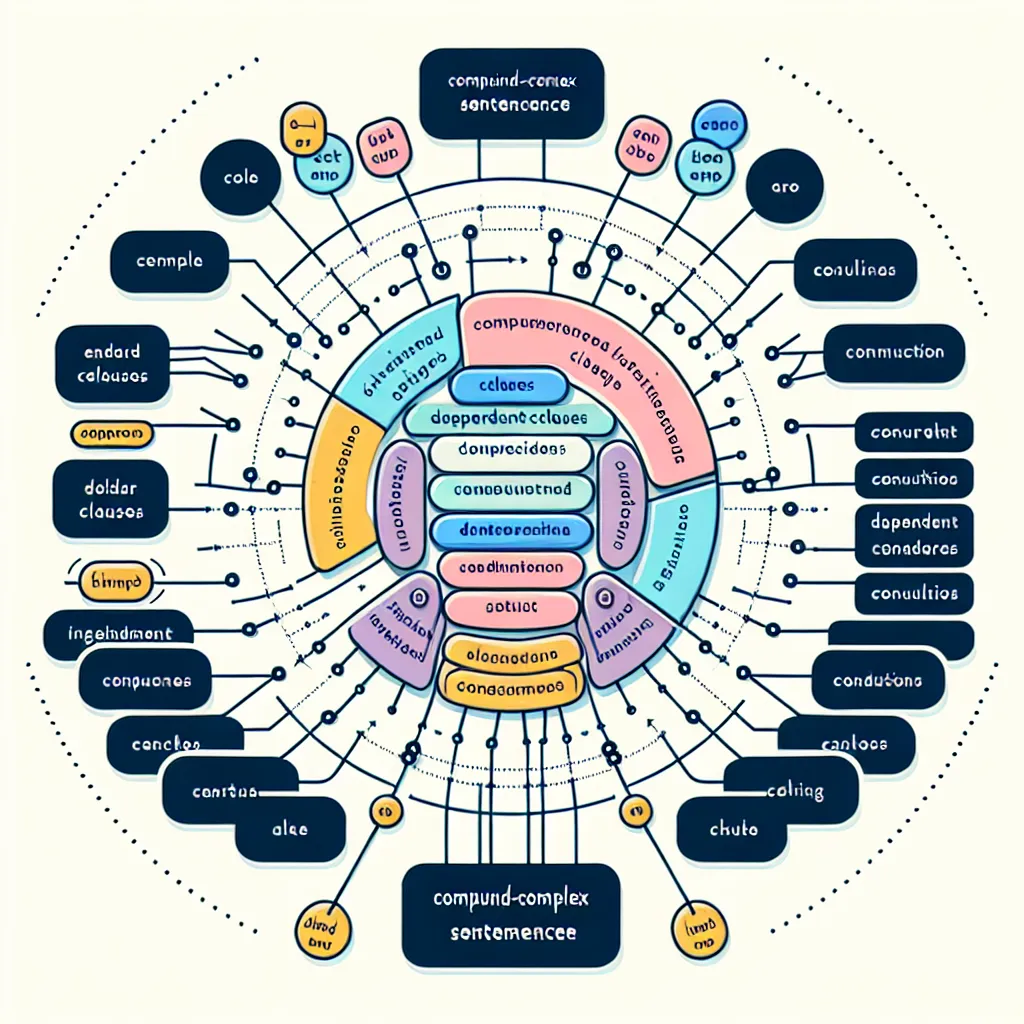Compound-complex sentences are a powerful tool in the IELTS exam, allowing test-takers to demonstrate sophisticated language skills and express complex ideas effectively. These sentences combine elements of both compound and complex sentences, creating a versatile structure that can elevate your writing and speaking performance. In this article, we’ll explore how to construct and use compound-complex sentences to boost your IELTS score.
Understanding Compound-Complex Sentences
A compound-complex sentence consists of at least two independent clauses and one or more dependent clauses. This structure allows for the expression of multiple ideas with varying levels of importance within a single sentence. In IELTS, mastering this sentence type can help you achieve higher scores in both the Writing and Speaking sections.
For example:
Although I studied hard, I failed the exam, but I will retake it next month.
- Independent clause 1: “I failed the exam”
- Independent clause 2: “I will retake it next month”
- Dependent clause: “Although I studied hard”

Formula and Grammar Rules
The basic formula for a compound-complex sentence is:
[Independent Clause] + [Coordinating Conjunction] + [Independent Clause] + [Subordinating Conjunction] + [Dependent Clause]
Note that the order of these elements can vary. Here are some key rules to remember:
- Use appropriate coordinating conjunctions (FANBOYS: For, And, Nor, But, Or, Yet, So) to join independent clauses.
- Use subordinating conjunctions (e.g., because, although, if, when) to introduce dependent clauses.
- Ensure proper punctuation, especially commas before coordinating conjunctions and after introductory dependent clauses.
Application in IELTS Writing
In IELTS Writing Task 2, using compound-complex sentences can help you express complex arguments more effectively. Consider this example:
While some people argue that technology has negative impacts on society, I believe it has brought numerous benefits, and we should continue to embrace technological advancements as they improve our quality of life.
This sentence combines two independent clauses with a coordinating conjunction (“and”) and includes a dependent clause introduced by “while.” It allows the writer to present a counterargument and their own position in a single, sophisticated sentence.
Application in IELTS Speaking
For the IELTS Speaking test, compound-complex sentences can help you provide more detailed and nuanced responses. For example:
I enjoy traveling to new places because it broadens my horizons, but I often feel homesick after a few days, which makes me appreciate my own culture even more.
This response uses a compound-complex structure to express multiple related ideas, demonstrating a high level of fluency and coherence.
Strategies for Achieving Higher Band Scores
To achieve higher band scores in IELTS, consider these strategies when using compound-complex sentences:
- Vary your sentence structures. Mix compound-complex sentences with other types to showcase your range.
- Use advanced vocabulary and idiomatic expressions within these sentences to further demonstrate language proficiency.
- Ensure your compound-complex sentences are relevant to the task or question at hand.
For example, a Band 7+ response might look like this:
Although environmental protection is crucial, economic growth remains a priority for many developing nations, and policymakers must strive to balance these competing interests while ensuring sustainable development for future generations.
This sentence demonstrates complex grammar, advanced vocabulary, and a nuanced understanding of the topic.
Common Mistakes to Avoid
When using compound-complex sentences in IELTS, be aware of these common pitfalls:
-
Run-on sentences: Avoid joining too many clauses without proper punctuation or conjunctions.
Incorrect: I love cooking it’s my passion I spend hours in the kitchen trying new recipes my family enjoys the meals.
Correct: I love cooking because it’s my passion, and I spend hours in the kitchen trying new recipes, which my family thoroughly enjoys. -
Misuse of conjunctions: Ensure you’re using coordinating and subordinating conjunctions correctly.
Incorrect: Although I studied hard, but I failed the exam.
Correct: Although I studied hard, I failed the exam. -
Lack of balance: Make sure your ideas are logically connected and the sentence doesn’t become too convoluted.
Incorrect: I want to travel the world, and learning languages is important, which is why I’m studying Spanish, but I also need to save money for my trip.
Correct: I want to travel the world, so I’m studying Spanish to improve my language skills, but I also need to save money for my trip.
Conclusion
Mastering compound-complex sentences can significantly enhance your IELTS performance. By combining multiple ideas with varying levels of importance, you can demonstrate sophisticated language use and express complex thoughts effectively. Remember to practice using these structures in context, focusing on clarity and relevance to the task at hand.
To further improve your IELTS skills, consider exploring related topics such as describing places that tourists rarely visit or discussing how to promote equality in education. These topics provide excellent opportunities to apply compound-complex sentences in your responses, helping you to refine your language skills and boost your confidence for the IELTS exam.